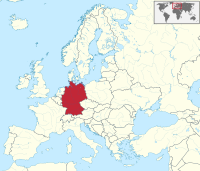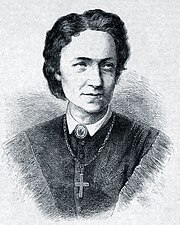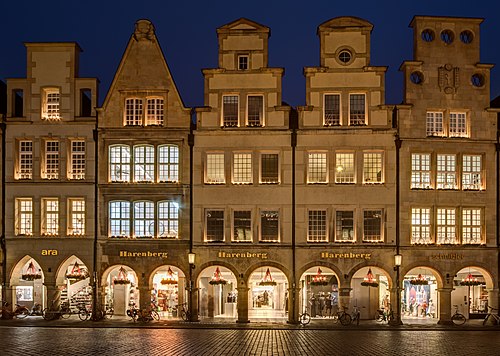
Back Portal:Dytschland ALS بوابة:ألمانيا Arabic Portal:Almaniya Azerbaijani Портал:Германия Bulgarian প্রবেশদ্বার:জার্মানি Bengali/Bangla Porched:Alamagn Breton دەروازە:ئەڵمانیا CKB Portál:Německo Czech Portal:Tyskland Danish Portal:Deutschland German
Welcome to the Germany Portal!
Willkommen im Deutschland-Portal!

|

|

| |
Germany (German: Deutschland), officially the Federal Republic of Germany, is a country in Central and Western Europe, lying between the Baltic and North Seas to the north and the Alps to the south. It borders Denmark to the north, Poland and the Czech Republic to the east, Austria and Switzerland to the south, France to the southwest, and Luxembourg, Belgium and the Netherlands to the west.
Germany includes 16 constituent states, covers an area of 357,578 square kilometres (138,062 sq mi) and has a largely temperate seasonal climate. With 83 million inhabitants, it is the second most populous state of Europe after Russia, the most populous state lying entirely in Europe, as well as the most populous member state of the European Union. Germany is a very decentralized country. Its capital and largest metropolis is Berlin, while Frankfurt serves as its financial capital and has the country's busiest airport.
In 1871, Germany became a nation-state when most of the German states unified into the Prussian-dominated German Empire. After World War I and the Revolution of 1918–19, the empire was replaced by the parliamentary Weimar Republic. The Nazi seizure of power in 1933 led to World War II, and the Holocaust. After the end of World War II in Europe and a period of Allied occupation, two new German states were founded: West Germany, formed from the American, British, and French occupation zones, and East Germany, formed from the western part of the Soviet occupation zone, reduced by the newly established Oder-Neisse line. Following the Revolutions of 1989 that ended communist rule in Central and Eastern Europe, the country was reunified on 3 October 1990.
Today, Germany is a federal parliamentary republic led by a chancellor. It is a great power with a strong economy. The Federal Republic of Germany was a founding member of the European Economic Community in 1957 and the European Union in 1993. Read more...
Selected article

Adelheid Luise "Adele" Spitzeder ([ˈaːdl̩haɪt ʔaˈdeːlə ˈʃpɪtˌtseːdɐ]; 9 February 1832 – 27 or 28 October 1895), also known by her stage name Adele Vio, was a German actress, folk singer, and con artist. Initially a promising young actress, Spitzeder became a well-known private banker in 19th-century Munich when her theatrical success dwindled. Running what was possibly the first recorded Ponzi scheme, she offered large returns on investments by continually using the money of new investors to pay back the previous ones. At the height of her success, contemporary sources considered her the wealthiest woman in Bavaria.
Opening her bank in 1869, Spitzeder managed to fend off attempts to discredit her for a few years before authorities were able to bring her to trial in 1872. Because Ponzi schemes were not yet illegal, she was convicted instead of bad accounting and mishandling customers' money and sentenced to three years in prison. Her bank was closed and 32,000 people lost 38 million gulden, the equivalent of almost 400 million euros in 2017 money, causing a wave of suicides. Her personal fortune in art and cash was stripped from her. (Full article...)
Selected picture
Related portals
- Parent portals
- Regional
- History
 Holy Roman Empire (900–1806)
Holy Roman Empire (900–1806) East Germany (1949–1990)
East Germany (1949–1990)
- Neighbouring countries
Anniversaries for April 28

- 1753 - Birth of Franz Karl Achard, discoverer of the production of sugar from sugar beets
- 1853 - Death of writer Ludwig Tieck
- 1858 - Death of physiologist Johannes Peter Müller
- 1908 - Birth of industrialist Oskar Schindler
- 1977 - Death of football player and manager Sepp Herberger
Did you know...
- ... that in opposition to his parents, opera star Joseph Schwarz began his career by running away from home to join a band of traveling minstrels?
- ... that Robert Winterberg's 1911 operetta Die Dame in Rot was adapted into English for Broadway?
- ... that in 1933 Nazi sympathisers attempted to kidnap two German-Jewish filmmakers in Liechtenstein?
- ... that in just one night, thousands of books on the experiences and medical care of transgender people in Nazi Germany were burned (pictured) for being "un-German"?
- ... that pianist and composer Josef Weiss created the first film score in the history of German cinema?
- ... that the ethical dilemma of killing baby Hitler has been compared to the trolley problem?
- ... that according to Lois N. Magner, Hildegard of Bingen's Physica is "probably the first book by a female author to discuss the elements and the therapeutic virtues of plants, animals, and metals"?
- ... that Tilmann Köhler directed Mozart's Le nozze di Figaro in 2023 with playful "serious games" in which the women win by "wit, cleverness and presence of mind"?
Selected cuisines, dishes and foods

Due to its centuries-old history as a major port town the cuisine of Hamburg is very diversified and sapid as ingredients' supply was safe. Until the 20th century, the cuisine of Hamburg was predominantly characterized by the extensive choice of different kinds of fish from the river Elbe and the nearby Baltic Sea. The region of Vierlande supplied Hamburg with fresh vegetables. Fruit came from the area Altes Land and until industrialization the neighbourhood of Wilhelmsburg was considered the ‘milk isle’ of Hamburg. International trade in the Port of Hamburg made spices and exotic nutrition items from India and South America available since the 16th century, which were soon incorporated into civic kitchens.
On this basis, the cuisine of Hamburg developed which regrettably lost some of its characteristics nowadays due to the supraregional harmonization of the North German cuisine. But due to its high economic importance, Hamburg does feature many internationally recognized gourmet restaurants from which 11 were repeatedly awarded with a Michelin star in 2010. (Full article...)Topics
Categories
Things you can do

A list of articles needing cleanup associated with this project is available. See also the tool's wiki page and the index of WikiProjects.
Here are some tasks you can do. Please remove completed tasks from the list.
- Requests: German Archaeological Institute at Rome, Deutsche Familienversicherung, Dietlof von Arnim-Boitzenburg, Hennes Bender, Georg Bernhard (1875–1944), Eduard Georg von Bethusy-Huc, Rolf Brandt (1886–1953), Jan Philipp Burgard, Georg Arbogast von und zu Franckenstein, Ferdinand Heribert von Galen, Herbert Helmrich, Monty Jacobs (1875–1945), Hans Katzer, Siegfried Kauder, Heide Keller, Matze Knop, Isidor Levy (1852–1929), Markus Löning, Anke Plättner, Hans Heinrich X. Fürst von Pless, Gerd Poppe, Victor-Emanuel Preusker, Hans Sauer (inventor), Franz August Schenk von Stauffenberg, Paul Schlesinger (1878-1928),Oscar Schneider, Hajo Schumacher, Otto Theodor von Seydewitz, Dorothea Siems, Werner Sonne, Anton Stark, Udo zu Stolberg-Wernigerode, Christoph Strässer, Torsten Sträter, Joseph von Utzschneider, Jürgen Wieshoff, Hans Wilhelmi,
- Unreferenced: Unreferenced BLPs, Bundesautobahn 93, Benjamin Trinks, Steeler (German band), Amelie Beese, Zoologisches Museum in Kiel, Emil Krebs, Prussian semaphore system, Partenstein, Peter Krieg, Porsche 597, Christa Bauch, Curt Cress, Stefan Beuse
- Cleanup: 53541 issues in total as of 2024-03-03
- Translate: Articles needing translation from German Wikipedia
- Stubs: Albersdorf, Thuringia, Ingo Friedrich, Berndt Seite, Federal Social Court; 108 articles in Category:German MEP stubs
- Update: Deutsches Wörterbuch
- Portal maintenance: Update News, Did you know, announcements and the todo list
- Orphans:
Orphaned articles in Germany

- Photo: Take/Add requested photographs
- Help assess the quality of 918 unassessed articles
Associated Wikimedia
The following Wikimedia Foundation sister projects provide more on this subject:
-
Commons
Free media repository -
Wikibooks
Free textbooks and manuals -
Wikidata
Free knowledge base -
Wikinews
Free-content news -
Wikiquote
Collection of quotations -
Wikisource
Free-content library -
Wikiversity
Free learning tools -
Wikivoyage
Free travel guide -
Wiktionary
Dictionary and thesaurus
© MMXXIII Rich X Search. We shall prevail. All rights reserved. Rich X Search











































